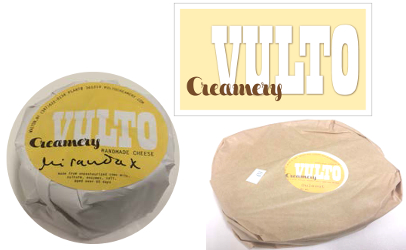Even though infected people may not develop symptoms until weeks from now, the federal government has declared that a deadly Listeria outbreak traced to raw milk cheese is over.
In its “final update” on the outbreak traced to soft, raw milk cheese from Vulto Creamery of Walton, NY, the Centers for Disease Control and Prevention reported on May 3 that eight people had been confirmed with the outbreak strain of Listeria monocytogenes. Officials found the strain in Vulto Creamery cheese collected at the production facility and from victims’ homes.
 All eight victims ate soft cheese before becoming ill. All eight victims had symptoms so severe that they required hospitalization. One victim was a newborn baby. Two victims, one from Vermont and one from Connecticut, died. The other victims were from New York and Florida. The Florida victim reported visiting New York and eating soft cheese before becoming ill.
All eight victims ate soft cheese before becoming ill. All eight victims had symptoms so severe that they required hospitalization. One victim was a newborn baby. Two victims, one from Vermont and one from Connecticut, died. The other victims were from New York and Florida. The Florida victim reported visiting New York and eating soft cheese before becoming ill.
The most recent victim became ill on March 13. Vulto Creamery had recalled its products just days before, on March 7 and 10.
It can take up to 70 days for symptoms of Listeria infection to develop, according to the CDC website. So, people who ate the recalled cheese in early March — or later if they already had it in their homes before the recall and were unaware of the danger — may not become sick until early July.
Seattle attorney Bill Marler, who is representing the families of the two outbreak victims who died, said Wednesday that it is non unusual for the CDC to issue a final report on an outbreak before all confirmed cases are counted.
“They have to draw a line and stop doing updates,” Marler said. “But for the victims and their families it’s never really over.”
Investigation details
Scientists and investigators used high-tech whole genome sequencing to identify the specific strain of Listeria monocytogenes that infected the victims. The same strain was found in all eight people. That indicated a common source, according to the CDC.
“State and local health departments interviewed ill people or their family members about the foods they ate or other exposures in the month before their illness started,” the CDC’s final update states.
“Based on those interviews, eight of eight people ate a soft cheese. The ill resident of Florida reported traveling to New York state and eating soft cheese there before becoming ill. Available information indicated that cheese made by Vulto Creamery was for sale at stores where at least seven of the ill people bought cheese before getting sick.”
The Connecticut Department of Public Health collected leftover cheeses from the home of the dead victim in that state. The outbreak strain of Listeria was identified in the leftover cheese, which the victim’s family identified as Ouleout cheese from Vulto Creamery.
The New York Division of Milk Control and Dairy Services collected three intact wheels of Ouleout cheese from Vulto Creamery. The outbreak strain of Listeria was identified in samples taken from the three wheels of cheese.
Vulto Creamery distributed the raw milk cheeses nationwide, with most sold in stores in the northeastern and Mid-Atlantic states; California; Chicago; Portland, Oregon; and Washington, D.C.
“This outbreak appears to be over. However, CDC recommends that consumers do not eat, restaurants do not serve, and retailers do not sell recalled raw milk cheeses made by Vulto Creamery,” according to the CDC update.
(To sign up for a free subscription to Food Safety News, click here.)
